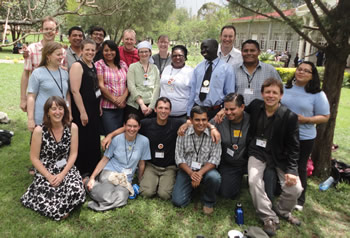
Quakerism is a religion and a way of life.
We more formally call ourselves The Religious Society of Friends.
In Europe and the Middle East, most Friends hold meetings for worship in the Liberal tradition, where they listen in silence for inspiration to give ministry. Friends try to live their lives to testimonies of truth, equality, peace and simplicity and have no creed or set of rules. This is more important to them than holding specific beliefs. Theologically, they represent a spread of witness in terms of Christianity, with some Friends and Meetings being more focussed on a traditional understanding of Christ’s role in humanity’s salvation and others taking a Universalist perspective. In recent years, new people have come into membership of the Religious Society of Friends without any Christian background – or from other religious traditions – and some find Christian language and references challenging.
Quakers emerged in England in 1652 and rapidly spread to the rest of Britain, Ireland and then North America. It now thrives in Latin America, many parts of Africa and around the world. Different worship styles and theologies have developed from these early beginnings. Outside Europe and the Middle East most Friends identify as Evangelical Christians, belonging to Friends Churches. They hold programmed services and employ Pastors. Other Quakers, usually called Conservative Friends, maintain the silent, unprogrammed tradition of worship, and also regard the Bible and Christian teachings as the bedrock of their faith. There are some Friends’ Evangelical Churches and Conservative Meetings in Europe. At present, they are not affiliated to EMES, but we can supply contact details for them to enquirers.
Quakers:
- Have a Christian heritage
- Seek to form individual religious beliefs
- Do not all hold like beliefs
- Hold that “there is that of God in everyone”. This means that we can all access the Divine, without needing an intermediary.
- Are guided by the values of peace, integrity, equality, community, simplicity
- Work in diverse ways towards making the world a better, fairer place. Quakers commonly partner with other groups working for the same purposes
- Were started in England in the 1650s (360 years ago) by George Fox
- Are in many parts of the world. There is a strong sense of international family. FWCC is the international body, which links Quakers
- Have status at the United Nations to be work for peace and justice
- Have used bold methods, over the ages, to achieve some of the big positives in world history. Early Quakers upset the king, and many were gaoled in very harsh conditions.
“Quaker” is really a nick-name for “The Religious Society of Friends”. So, Quakers are often called Friends.
Different styles of Quakerism have developed.
- Evangelical Friends use the Bible as their central reference, and believe in the importance of personal salvation. It is more common that Evangelical-style worship is led (readings, prayers, hymns). Evangelical Friends find much joy in their sharing of words and songs.
Evangelical Quakers often speak of their Quaker Church. - Liberal Friends value the direct connection with the (Divine) Spirit, and hold that if they take time to listen their lives will be guided by the Spirit. Liberal Friends gather mainly in expectant silence as their worship. Being together supports the ability to listen and hear. Occasionally a Friend will stand and speak, with a message that they feel led to share. The quiet supports a sense of peace and empowerment. Sometimes it brings challenge as well.
Liberal Quakers often refer to their Quaker Meeting.
Of course, both styles have a strong sense of fellowship and community, and often engage in service projects together.
There are styles of Quakerism which blend these styles. In these times, the style most likely depends on where the Church/Meeting is situated in the world.
In AWPS we have evangelical friends, friends who have programmed worship and liberal friends who have unprogrammed worship based on silence (sometimes called expectant waiting)
Learn more about Quakers here
